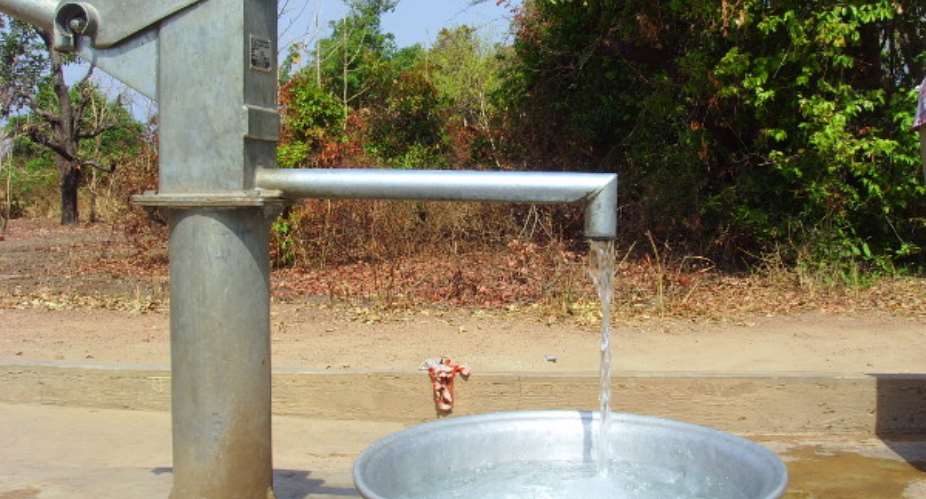As part of this year’s celebration of World Water Day on the theme, ‘Nature For Water”, WaterAid Ghana is calling for urgent action from the government to reach the 22% of Ghanaians without access to clean water close to their homes, and leave no one behind.
WaterAid’s State of the World’s Water 2018: The Water Gap examines the countries in the world with the highest percentages and largest numbers of people who cannot get clean water within a half hour round trip, as well as those with the most progress, and demonstrates the sizeable gap between the rich and poor when it comes to access to water.
Ghana has 78% water coverage, according to the most recent UNICEF-WHO Joint Monitoring Programme figures.
Today, 844 million people globally do not have clean water, a number which has risen from last year. This is in part because those who are not able to fetch water within a half hour round trip no longer count as having access to water, compounding pressures from urbanization, population growth, shock weather events and poor financing and prioritization of water supply.
The report comes as nations prepare for a July 2018 review of the United Nations' Sustainable Development Goal 6, to deliver water and sanitation to everyone, everywhere by 2030.
Among the main findings, Eritrea, Papua New Guinea and Uganda, are the three countries with the lowest access to clean water close to their homes, with Uganda being a new addition to the list this year at 38% access.
Mozambique ranks fourth in the table of countries making greatest progress in water provision, but remains 10th in the world for lowest access to water. Its capital city, Maputo, is currently experiencing severe water shortages and is now preparing for rationing.
Almost every country struggling to provide its people with clean water also has a huge gap in access between richest and poorest.
For instance, in Niger, only 41% of the poorest people have access to water, while 72% of its wealthiest do. In neighbouring Mali, the gap widens to 45% and 93%, respectively. In Uganda, only 35% of the poorest have access to clean water close to home, while 72% of the wealthy do.
India, while still having the most people without clean water, is also near the top of the list for most people reached: more than 300 million between 2000 and 2015, or nearly equivalent to the population of the United States.
Abdul-Nashiru Mohammed, the Country Director of Ghana said “Cape Town is a wake-up call for all of us, reminding us that access to water, our most precious resource, is increasingly under threat. Those marginalised or living in a slum or remote rural community, are hardest to reach and will continue to suffer as long as governments do not prioritise and fund access to water for all.”
This World Water Day, WaterAid Ghana has thus called on the Government to support Nature Based Solutions (NBS).
Therefore, the organisation said there is an urgent need for the Government and all its MMDAs to do the following:
- Restore wetlands
- Reconnect rivers to flood plains
- Replenish forest and (protect all existing forests)
- Ensure buffers are maintained along rivers and streams
- Consider the use of sand dams in the one village one dam policy
- Ensure that various commitments made in addressing water issues in Ghana are fulfilled.





 We’ll no longer tolerate your empty, unwarranted attacks – TUC blasts Prof Adei
We’ll no longer tolerate your empty, unwarranted attacks – TUC blasts Prof Adei
 Bawumia donates GHc200,000 to support Madina fire victims
Bawumia donates GHc200,000 to support Madina fire victims
 IMF to disburse US$360million third tranche to Ghana without creditors MoU
IMF to disburse US$360million third tranche to Ghana without creditors MoU
 Truck owner share insights into train collision incident
Truck owner share insights into train collision incident
 Paramount chief of Bassare Traditional Area passes on
Paramount chief of Bassare Traditional Area passes on
 Two teachers in court over alleged illegal possession of BECE papers
Two teachers in court over alleged illegal possession of BECE papers
 Sunyani: Victim allegedly shot by traditional warriors appeals for justice
Sunyani: Victim allegedly shot by traditional warriors appeals for justice
 Mahama vows to scrap teacher licensure exams, review Free SHS policy
Mahama vows to scrap teacher licensure exams, review Free SHS policy
 Government will replace burnt Madina shops with a new three-story, 120-store fac...
Government will replace burnt Madina shops with a new three-story, 120-store fac...
